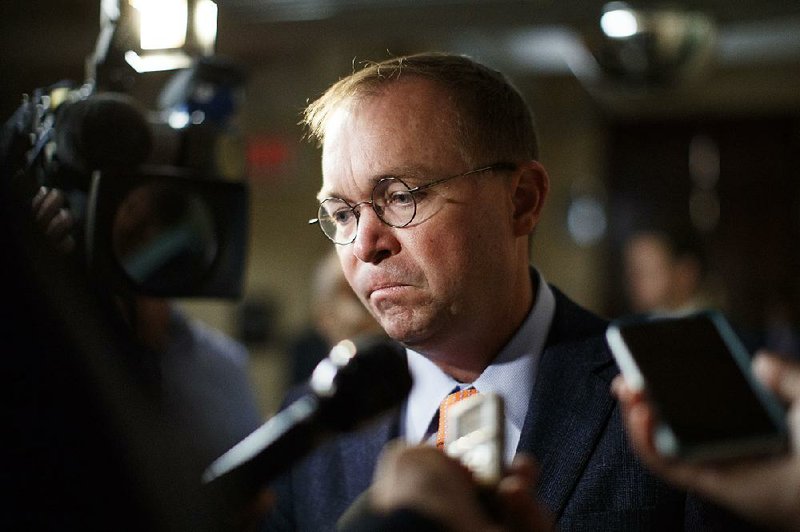WASHINGTON -- President Donald Trump sent lawmakers a plan Tuesday to wipe more than $15 billion in unused spending off the government's books.
The plan wouldn't have much practical impact on targeted programs such as the popular Children's Health Insurance Program. But the move would take away leftover money that could be used to pay for other budget priorities.
House Republican leaders hope to pass the measure this month, but it faces more resistance in the narrowly divided Senate despite being tailored to leave this year's $1.3 trillion catchall spending bill alone. Many GOP conservatives blasted that "omnibus" measure as too bloated, while more moderate Republicans said they would oppose any efforts to cut from it.
Trimming previously allocated funding used to be common in Washington. But the so-called rescissions process hasn't been used since President Bill Clinton's administration.
"Washington has a spending problem," said White House budget director Mick Mulvaney. "By utilizing a tool deployed by every president from [Gerald] Ford to Clinton, today's historic $15.4 billion rescissions package is an obvious step toward reducing unnecessary spending and protecting the American taxpayer."
If approved, the tactic would only have a tiny effect on the government's budget deficit, which is on track to total more than $800 billion this year. Some of the cuts wouldn't affect the deficit at all, since budget scorekeepers don't give credit for rescinded money that they don't think would have ever been spent, and the White House calculates the cuts would only curb the deficit by $3 billion.
For instance, more than $4 billion in cuts to a loan program designed to boost fuel-efficient, advanced-technology vehicles wouldn't result in fewer loans, because the loans are no longer being made. And $107 million worth of watershed restoration money from the 2013 Superstorm Sandy aid bill is going unused because local governments aren't stepping up with matching funds. Another $252 million is left over from the 2015 fight against Ebola, which had been declared over -- but the proposal could be rethought with Tuesday's news of two cases of Ebola in the Congo.
[PRESIDENT TRUMP: Timeline, appointments, executive orders + guide to actions in first year]
Still, the cuts, if enacted by Congress, would take spending authority off the table so it couldn't be tapped by lawmakers for other uses. The catchall spending bill, for instance, contained $7 billion in cuts to the Children's Health Insurance Program that were used elsewhere to boost other programs, including new spending at the Department of Health and Human Services.
"This is money that shouldn't be spent, can't be spent in certain circumstances, doesn't need to be spent. What's your argument for voting against that?" Mulvaney said, noting that top Democrats such as Senate Minority Leader Charles Schumer have supported such cuts before. "Rescissions used to be the ordinary course of business in Washington, D.C. .... I'm not sure why they're against it just because Donald Trump is president."
A majority of Democrats in both the House and Senate supported the catchall spending bill and its $7 billion in cuts to the Children's Health Insurance Program, but party leaders were still critical of the Trump proposal.
"Let's be honest about what this is: President Trump and Republicans in Congress are looking to tear apart the bipartisan Children's Health Insurance Program, hurting middle-class families and low-income children," Schumer said.
The proposal has already had a tortured path even before its unveiling. Moderate Republicans, including the senior ranks of the powerful House and Senate Appropriations committees, rebelled against the measure. They argued that it would be breaking a bipartisan budget pact just weeks after it was negotiated. In response, Mulvaney cleansed the measure of cuts to the huge omnibus bill.
The idea faces a challenging path in Congress -- particularly the Senate, where a 51-49 GOP majority leaves little room for error even though budget rules permit rescission measures to advance free of filibuster threats. But the cuts to the popular Children's Health Insurance Program probably could still be filibustered because they are so-called mandatory programs rather than annual appropriations.
A Section on 05/09/2018

